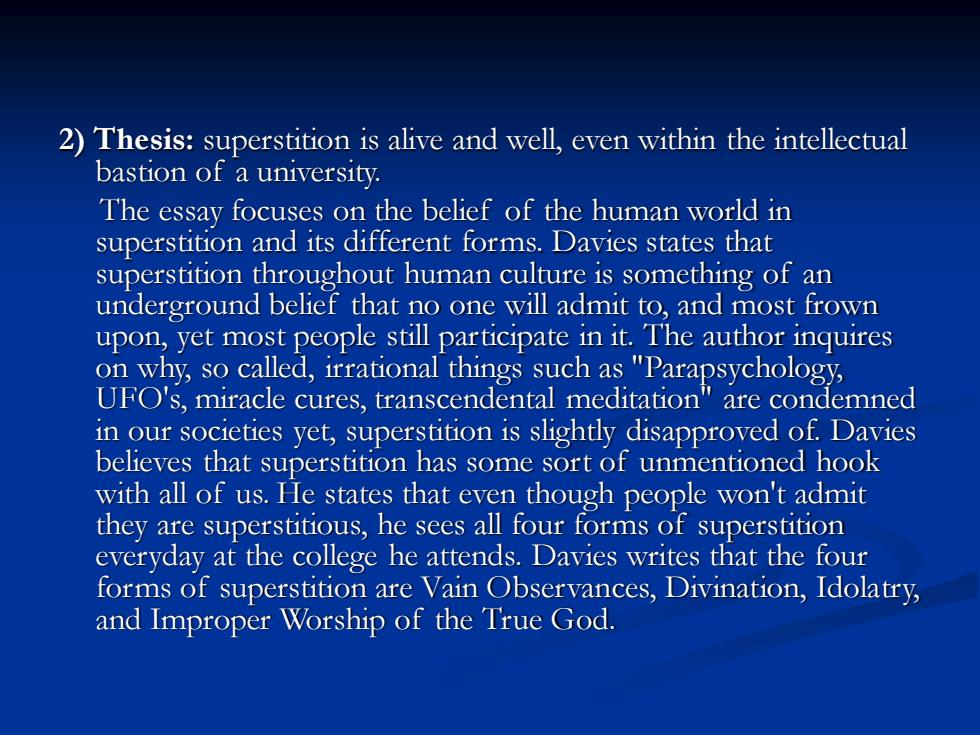
2)Are you superstitious?What kind of person is more likely to be superstitious? Superstition is not only for the naive and ignorant but that it is "alive and flourishing among the people who are indisputably rational and learned
2) Are you superstitious? What kind of person is more likely to be superstitious? Superstition is not only for the naïve and ignorant but that it is “alive and flourishing among the people who are indisputably rational and learned

3)Why people frown on superstition yet still keep their own superstition? Some people might not even realize that what they are doing is considered a superstition and is the very thing they look down on. ■ A way for us to control that element of our lives and give us a feeling of power. can subconsciously help take off the pressure of failure in the person's mind. Humans want to know what their fate is and have some control over it because of the human desire to have knowledge of their own fate
3) Why people frown on superstition yet still keep their own superstition? ◼ Some people might not even realize that what they are doing is considered a superstition and is the very thing they look down on. ◼ A way for us to control that element of our lives and give us a feeling of power. ◼ can subconsciously help take off the pressure of failure in the person's mind. ◼ Humans want to know what their fate is and have some control over it because of the human desire to have knowledge of their own fate

2.Information related to the text: 1)The author:One of Canada's best-known satirists,novelists,and playwrights,Davies published numerous plays and critical studies on drama and stagecraft and is known throughout Canada for the delightful satires he wrote under the pseudonym "Samuel Marchbanks."However, his reputation rests chiefly on his novels
1) The author: One of Canada's best-known satirists, novelists, and playwrights, Davies published numerous plays and critical studies on drama and stagecraft and is known throughout Canada for the delightful satires he wrote under the pseudonym "Samuel Marchbanks." However, his reputation rests chiefly on his novels. 2. Information related to the text:

Robertson Davies William Robertson Davies(1913-1995)was educated at Upper Canada College in Toronto,at Queen's University in Kingston,and at Oxford University in England.He was one of Canada's best-known and most popular satirist,novelist, and playwright,and one of its most distinguished "men of letters",a term Davies is variously said to have gladly accepted for himself and to have detested.Davies was the founding Master of Massey College,a graduate residential college associated with the University of Toronto
Robertson Davies William Robertson Davies(1913-1995) was educated at Upper Canada College in Toronto, at Queen's University in Kingston, and at Oxford University in England. He was one of Canada's best-known and most popular satirist, novelist, and playwright, and one of its most distinguished "men of letters", a term Davies is variously said to have gladly accepted for himself and to have detested. Davies was the founding Master of Massey College, a graduate residential college associated with the University of Toronto

2)Thesis:superstition is alive and well,even within the intellectual bastion of a university. The essay focuses on the belief of the human world in superstition and its different forms.Davies states that superstition throughout human culture is something of an underground belief that no one will admit to,and most frown upon,yet most people still participate in it.The author inquires on why,so called,irrational things such as "Parapsychology, UFO's,miracle cures,transcendental meditation"are condemned in our societies yet,superstition is slightly disapproved of Davies believes that superstition has some sort of unmentioned hook with all of us.He states that even though people won't admit they are superstitious,he sees all four forms of superstition everyday at the college he attends.Davies writes that the four forms of superstition are Vain Observances,Divination,Idolatry, and Improper Worship of the True God
2) Thesis: superstition is alive and well, even within the intellectual bastion of a university. The essay focuses on the belief of the human world in superstition and its different forms. Davies states that superstition throughout human culture is something of an underground belief that no one will admit to, and most frown upon, yet most people still participate in it. The author inquires on why, so called, irrational things such as "Parapsychology, UFO's, miracle cures, transcendental meditation" are condemned in our societies yet, superstition is slightly disapproved of. Davies believes that superstition has some sort of unmentioned hook with all of us. He states that even though people won't admit they are superstitious, he sees all four forms of superstition everyday at the college he attends. Davies writes that the four forms of superstition are Vain Observances, Divination, Idolatry, and Improper Worship of the True God